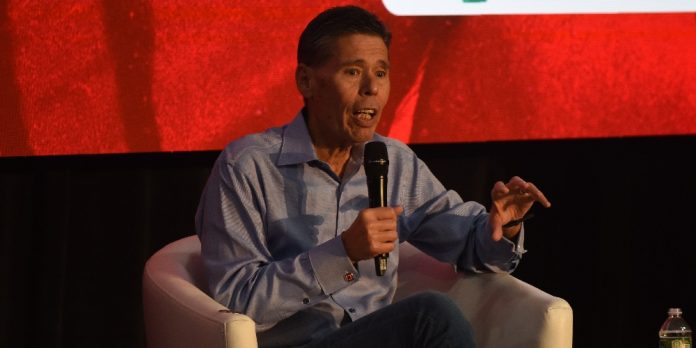With the world still adapting to the new normal and life after the COVID pandemic, Jeff Yabuki, Chairman of the Board at Sportradar, has urged industry leaders to make it okay to speak about mental health and wellness.
Speaking during his keynote titled Staying Ahead of an Accelerating Industry at SBC Summit North America, Yabuki was asked by the panel’s moderator Sue Schneider, Vice President of Growth & Strategy/Americas at SBC, about how industry leaders should address mental health in their operations.
Mental health
On the Converging Worlds track, the Sportradar Chairman highlighted his own experience with mental health, recalling the story of his brother who passed away five years ago.
Yabuki said: “Five years ago last week, my brother who I was very, very close to, died by suicide, and he left a young family, a wife, my parents, me, and that was life-changing for me – I’ve not had anything like that before. Much to my chagrin, I did not talk about that publicly at the time, because that’s not what CEOs do. Our job is to be strong and so we put those things aside.
“A year ago, my family made a very large commitment to pediatric mental health and I went out and told my story as part of that. I literally couldn’t believe all of the people who came up to me and said, ‘Thank you for sharing that story’. What I found is every single person has had an experience like that in their own family, a close friend, or one degree of separation, and there’s nowhere for us to go with those kinds of things.
“So for me, it was incredibly enlightening, to want to be out and be a role model, and to talk about it. We don’t have time for me to talk about the program but I’m quite excited about it. I’m even more excited about the opportunity because you see it in sports figures, you see it in politicians, you see it in actors and actresses, and everyone is struggling. That is a common bond across the entire populace.”
Promoting wellness
Yabuki then told a story about how, in the mid-2000s, during his time as CEO of Fiserv, he had asked his team to fund wellness cover, which turned out to be a fantastic decision for the company as it lowered their expenses.
Now, for Yakubi, the next step is mental health.
He stated: “Back in 2006/2007 – you don’t know this about me, I’m quite analytical. I love numbers. Because numbers don’t lie, just people do – I was having a conversation about the idea of wellness because, at that time, no one was funding wellness. Benefit plans didn’t cover wellness. They didn’t cover physical, they didn’t cover wellness. Why not? Because there’s no immediate payback.
“I had our teams do all this analysis that showed there was zero payback on wellness, zero. Why was there zero payback on wellness? Because no one had really ever funded it. So I said, ‘I don’t care what it says, we’re gonna fund wellness’.
“Five years later, it flowed through the numbers beautifully. Our expenses were lower, so it was great, but we don’t have mental wellness. That’s the next place we’re going.”
Changing the perspective
Yabuki then surveyed the room and asked how many people have had a mental wellness check over the past year, with only a few hands being raised. He then asked how many people had received coaching at any point in their life, to which much of the room raised their hand.
The Sportradar Chairman explained how the world needs to view wellness more like strength training, nutrition advice, or learning fundamentals to change its perspective, adding that people shouldn’t be embarrassed or ashamed to receive support if their places of work offer it, noting that “we all need help at this time”.
Yabuki concluded: “If I were to give you only one piece of advice, if you could leave the room with one piece of advice, make it okay for your teams and your businesses to share some of the anxiety, to share some of the stress, to have an outlet, to connect with people on that basis.
“If you can, you will unlock potential that you never even imagined was possible before.”














